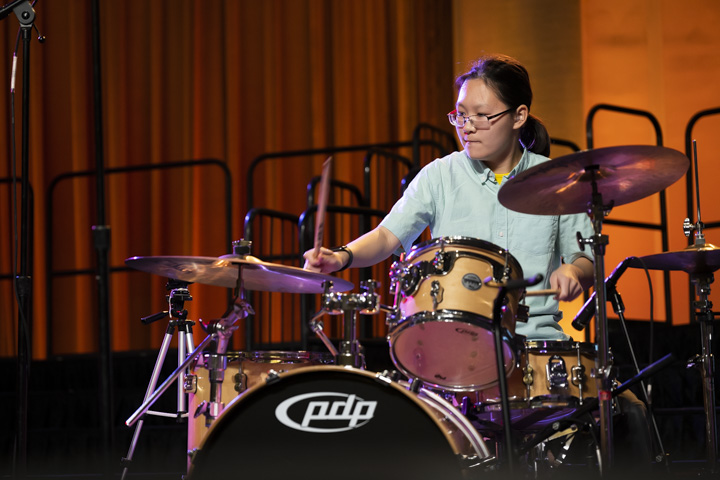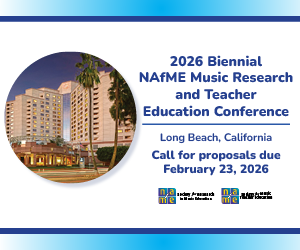/ News Posts / Cultural Appropriation versus Cultural Appreciation in the Arts
Cultural Appropriation versus Cultural Appreciation in the Arts
Part One of a Four-Part Series
By NAfME Member Roque Diaz, Member of the NAfME Equity Committee
As educators and professionals in various creative fields, it is crucial to understand the impact of our work on different cultures and to foster a respectful and inclusive environment. A few related thoughts on this topic:
🤔 Defining Cultural Appropriation:
Cultural appropriation refers to the adoption, borrowing, or imitation of elements from another culture, often without proper understanding or respect for its historical or social context. It can perpetuate stereotypes, commodify traditions, and even lead to the erasure of underrecognized voices. As arts educators, we must be mindful of the power dynamics at play and recognize that cultural expressions are deeply rooted in personal and collective experiences.
🙌 Embracing Cultural Appreciation:
On the other hand, cultural appreciation involves genuinely recognizing, respecting, and celebrating cultures. It involves engaging with cultural practices, traditions, and art forms in a way that honors their origins and empowers the communities from which they originate. By appreciating different cultures, we can foster cross-cultural understanding, promote diversity, and create meaningful connections through our artistic endeavors.
🎭 Navigating the Arts:
In the realm of arts, it is essential to approach cultural influences with sensitivity and ethical considerations. Here are a few key points to keep in mind:
- Educate Yourself: Take the time to learn about the history, significance, and context of the cultural elements you wish to incorporate into your work. Understanding the cultural background helps avoid misrepresentation and promotes appreciation.
- Collaboration and Empowerment: When exploring cultural themes, consider collaborating with stakeholders from those cultures. Their perspectives and insights can enrich your work while ensuring authenticity and inclusivity.
- Give Credit Where It’s Due: Acknowledge and credit the cultural influences in your art. Highlighting the origins of your inspiration shows respect and helps raise awareness about different cultures.
- Amplify Underrecognized Voices: Instead of appropriating cultural practices, use your platform to amplify underrecognized artists and their work. This promotes inclusivity and allows for authentic representation within the arts community.
🌟 Striving for Cultural Exchange:
Ultimately, our goal should be to foster a culture of genuine appreciation and respectful exchange. By actively engaging in conversations about cultural appropriation versus cultural appreciation, we can create a more inclusive artistic landscape that celebrates diversity, equity, inclusion, access, and promotes understanding.
Respectfully,
![]()
Read part 2, part 3, and part 4 in this series.
About the author:
Dr. Roque Diaz is a seasoned executive leader with over two decades of experience in education, arts administration, and diversity, equity, and inclusion (DEI) strategy. A first-generation, neurodivergent Puerto Rican, Dr. Diaz brings a deeply personal and systemic approach to advancing equity across sectors.
He previously served as the Senior Director of DEI at MacPhail Center for Music, where he led the organization’s equity strategy, integrated DEI into a $25M capital campaign, and secured the largest grant in the institution’s history. He also launched innovative statewide education programs and built partnerships that expanded access to high-quality music education for historically underserved communities.
Dr. Diaz is the Founder of Progressing Forward, LLC, a consulting firm dedicated to inclusive systems change, strategic planning, and capacity building across nonprofits, schools, and arts organizations. His work helps institutions move from transactional DEI efforts to sustainable, equity-driven impact.
A professionally trained trumpeter, Dr. Diaz has performed internationally in orchestral, chamber, jazz, and Latin music settings. His leadership is shaped by a commitment to ensuring that future generations experience more inclusive and culturally responsive environments.
He currently serves on several nonprofit boards and advisory groups focused on arts, education, and social justice, bringing expertise in governance, strategic planning, fundraising, and inclusive leadership.
Interested in reprinting this article? Please review the reprint guidelines.
The National Association for Music Education (NAfME) provides a number of forums for the sharing of information and opinion, including blogs and postings on our website, articles and columns in our magazines and journals, and postings to our Amplify member portal. Unless specifically noted, the views expressed in these media do not necessarily represent the policy or views of the Association, its officers, or its employees.
Published Date
July 25, 2025
Category
- Culturally Relevant Teaching
- Culture
- Diversity, Equity, Inclusion, and Access (DEIA)
- Race
- Representation
Copyright
July 25, 2025. © National Association for Music Education (NAfME.org)





